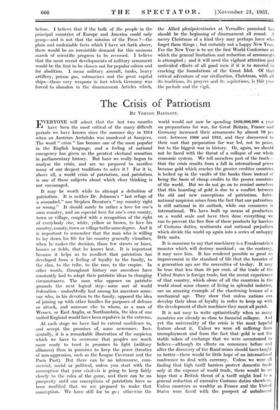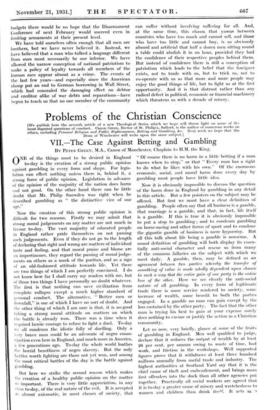The Crisis of Patriotism
BY VERNON BARTLETT.
EVERYONE will admit that the last two months have been the most critical of the many difficult periods we have known since the summer day in 1914 when an Austrian Archduke was murdered at Sarajevo. The word " crisis " has become one of the most popular in the English language, and a feeling of national emergency has given us the greatest electoral sensation in parliamentary history. But have we really begun to analyse the • crisis, and are we prepared to sacrifice many of our deepest traditions to solve it ? For it is, above all, a world crisis of patriotism, and patriotism is one of those subjects about which clear thinking is not encouraged.
It may be worth while to attempt a definition of patriotism. It is neither Dr. Johnson's " last refuge of a scoundrel," nor Stephen Decatur's " my country right or wrong." It should surely be rather a love for one's own country, and an especial love for one's own county, town or village, coupled with a recognition of the right of everybody else, white, yellow or brown, to love his country, county, town or village to the same degree. And it is important to remember that the man who is willing to lay down his life for his country generally visualizes, when he makes the decision, those few streets or lanes, houses or fields, that he knows best. It is important because it helps us to recollect that patriotism has developed from a feeling of loyalty to the family, to the clan, to the tribe, to the race, to the -empire. In other words, throughout history our ancestors have constantly had to adapt their patriotic ideas to changing circumstances. The man who opposes on patriotic grounds the next logical step—some sort of world federation—undoubtedly had among his ancestors some- one who, in his devotion to the family, opposed the idea of joining up with other families for purposes of defence or attack, and someone else to whom, as a man of Wessex, or East Anglia, or Northumbria, the idea of one united England would have been repulsive in the extreme.
At each stage we have had to extend confidence to, and accept the promises of, some newcomer. Inci- dentally, it is a remarkable illustration of the suspicion which we have to overcome that peoples are much more ready to trust in promises to fight (military alliances) than in promises to keep the peace (treaties of non-aggression, such as the League Covenant and the Paris Pact). But there can be no intercourse, com- mercial, social or political, unless you start with the assumption that your vis-a-vis is going to keep fairly closely to the rules of the game, and there can be no prosperity until our conceptions of patriotism have so been modified that we are prepared to make that assumption. We have still far to go;- otherwise the world would not now be spending £800,000,000 a year on preparations for war, for Great Britain, France and Germany increased their armaments by almost 70 per cent. between 1908 and 1913, and they discovered to their cost that preparation for war led, not to peace, but to the biggest war in history. Or, again, we should not be faced with the threat of a collapse of our whole economic system. We tell ourselves part of the truth— that -the crisis results from a fall in international prices because gold which reaches the greater creditor countries is locked up in the vaults of the banks-there instead of being the basis of cheap credits to the poorer countries of the world. But we do not go on to remind ourselves that this hoarding of gold is due to a conflict between the old and new conceptions of patriotism. Inter- national suspicion arises from the fact that our patriotism is still national in its outlook, while our commerce is international. We have built up means of production on a world scale and have then done. everything we can to prevent the free flow of these products by barriers of Customs duties, sentiments and national prejudices which divide the world• up again into a series of unhappy little units.
It is nonsense to say that machinery is a Frankenstein's monster which will destroy mankind ; on the contrary, it may save him. It has rendered possible so great an improvement in the standard of- life that the luxuries of a generation ago are the necessities of to-day. It may be true that less than 10 per cent. of the trade of the United States is foreign trade, but the recent experiences of that country, which alone of all the countries in the world stood some chance of living in splendid isolation, are an amazing example of the chastening lessons of a mechanical age. They show that unless nations- can develop their ideas of loyalty in order to keep- up with the development of their machines they must all perish.
It is not easy to write optimistically when so many countries are already so close to financial collapse; And yet the universality of the crisis is the most hopeful feature about it. Unless we were all suffering from unemployment and from the fact- that' gold is not the stable token of exchange that we were- accustomed to -believe--L-although its effects on commerce before and after the discovery of the Rand miries should have taught is better—there would be little hope of an international conference to -deal with currency.- Unless we were all finding that high tariff barriers protect domestic- trade only at the expense of world trade, there would be no hope that a British threat of- a tariff might lead to a general reduction of excessive Customs duties elsewhere. Unless countries as wealthy as France and the United States were faced with the prospect of unbalanced budgets there would be no hope that the Disarmament Conference, of next February would succeed even in limiting armaments at their present level.
We have told ourselves often enough that all men are brothers, but we have never believed it. Instead, we have believed that a man who talked a language different from ours must necessarily be our inferior. We have allowed the narrow conception of national patriotism to make a policy of loyalty towards all members of the human race appear almost as a crime. The events of the last few years—and especially since the American slump put an end to German borrowing in Wall Street, which had concealed the damaging effect on debtor and creditor alike of war debts and reparations—have begun to teach us that no one member of the community can suffer without involving suffering for all. And, at the same time, this chasm that yawns between countries who have too much and cannot sell, and those who have too little and cannot buy, is so obviously absurd and artificial that half a dozen men sitting round a table could abolish it in an hour, provided they had the confidence of their respective peoples behind them. But instead of confidence there is still a conception of patriotism which leads to the belief that the foreigner exists, not to trade with us, but to trick us, not to co-operate with us so that more and more people may enjoy the good things of life, but to fight us at the first opportunity. And it is that distrust rather than any radical defect in political, economic or financial machinery which threatens us with a decade of misery.

































































 Previous page
Previous page